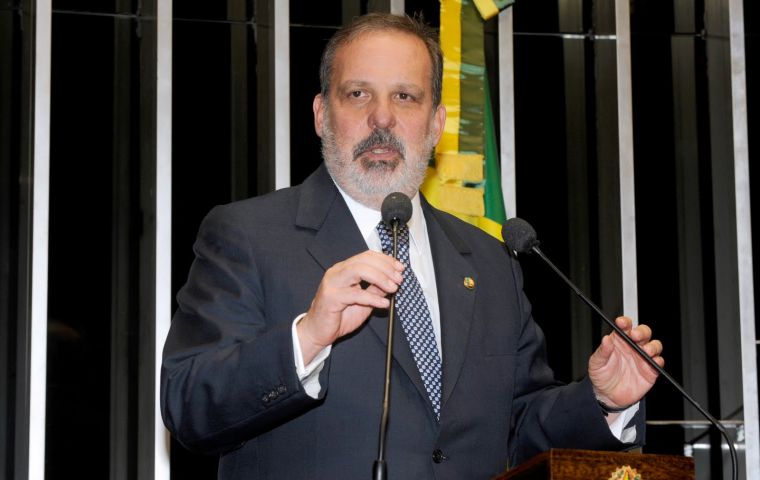MercoPress. South Atlantic News Agency
Rousseff names another market-friendly minister to her new cabinet
 Monteiro, an industrialist and senator from Pernambuco, led Brazil's most powerful business lobby: National Industry Confederation, from 2002 to 2010.
Monteiro, an industrialist and senator from Pernambuco, led Brazil's most powerful business lobby: National Industry Confederation, from 2002 to 2010. Brazilian President Dilma Rousseff has named business leader Armando Monteiro to head the industry and trade ministry in a new sign of more market-friendly policies as she tries to restore investor confidence and reignite economic growth.
Monteiro, an industrialist and senator from the northern state of Pernambuco, led Brazil's most powerful business lobby, the National Industry Confederation, from 2002 to 2010. The choice is also aimed at securing the support of Monteiro's PTB party, which backed opposition candidate Aecio Neves in the October election that was narrowly won by Rousseff.
Monteiro said his appointment was aimed at strengthening government ties to private industry, which has struggled in recent years as the economy has slowed and investors have lost trust in Rousseff's policies.
“Regaining macroeconomic balance is the prime condition for recovering confidence and restoring more vigorous growth, which needs increased investment, exports and productivity,” Monteiro said at a news conference.
Brazil must seek to sign trade agreements, such as the one under negotiation between Mercosur and the European Union, to expand exports and reverse declines in sales of manufactured goods, he said.
Brazil posted its third straight monthly trade deficit in November, raising the possibility the commodities powerhouse could record its first annual trade deficit in more than a decade this year.
Brazil's economy limped out of a brief recession in the third quarter and Rousseff faces the challenge of encouraging investment while reining in spending to avert the risk of credit rating downgrade.
Last week, Rousseff named banker Joaquim Levy to head her economic team. Levy said he is looking for ways to cut government spending so that Brazil can meet its fiscal savings targets, a key gauge of its ability to pay its debts.
Levy's appointment was well received by markets, which see him pushing for more market-friendly policies. Levy is a 'Chicago boy' and is known as “scissor hands”
In his first comments, Monteiro said industrial policy must go hand in hand with fiscal and monetary policy, and he pledged his adherence to Brazil's three-pronged strategy of low inflation, a free-floating currency and responsible fiscal policies.
Rousseff is considering naming another business leader turned senator, Katia Abreu, to the agriculture ministry, according to local media reports. Abreu, former president of the farm lobby, the National Confederation of Agriculture, has clashed with environmentalists over expansion of Brazil's agricultural lands. The country is the world's top exporter of soy, beef, coffee and sugar.




Top Comments
Disclaimer & comment rules-

-

-

Read all commentsFirst steps: stop sending money to Cuba and forgiving “friendly” countries debts, fighting widespread corruption and government spending. Dilma must stay at 3 or 4 star hotels and take less people along her international trips, forget that communism might do any good to Brazil's economy: Venezuela is not an example.
Dec 02nd, 2014 - 11:22 am 0Besides all the above, fat 'D' should downsize the Federal Government, close down useless Ministries, cut absurd salaries and benefits of high-ranking public employees and politicians, and steer Brazil away from the ideology of the hard-core Petistas, which is to turn Brazil into a continental-sized Cuba, with them reigning absolute.
Dec 02nd, 2014 - 04:05 pm 0hmm... I wonder if this is just 'window-dressing' or has she realised that 'her way' simply doesn't work?
Dec 03rd, 2014 - 12:56 am 0We shall wait and see...
Commenting for this story is now closed.
If you have a Facebook account, become a fan and comment on our Facebook Page!